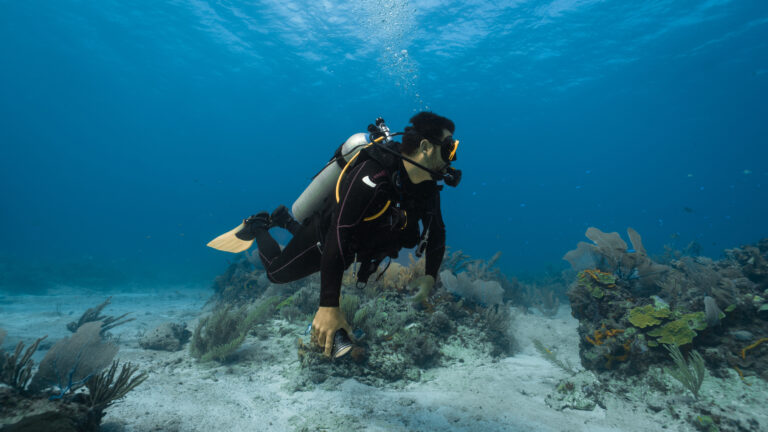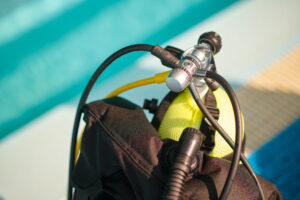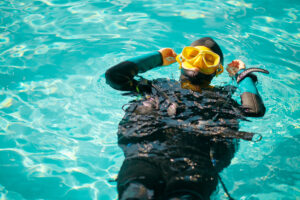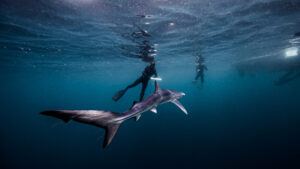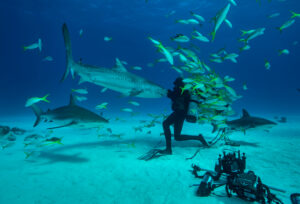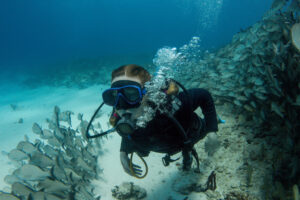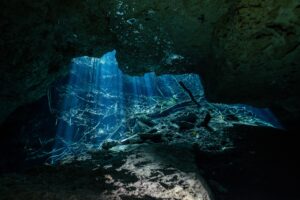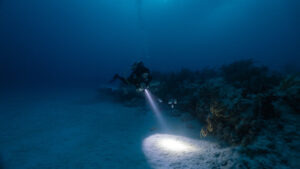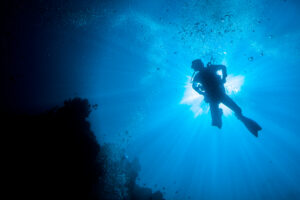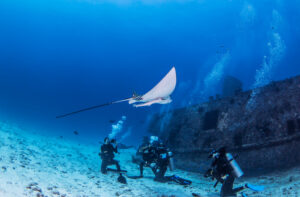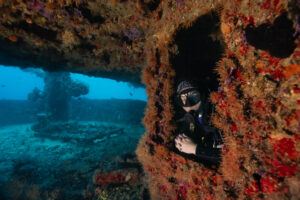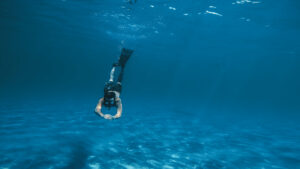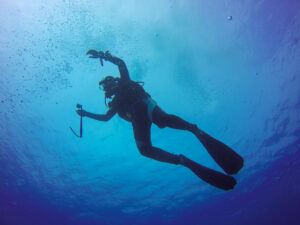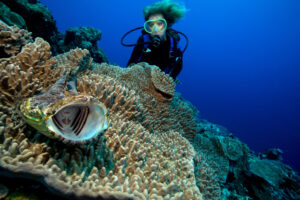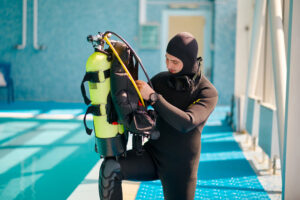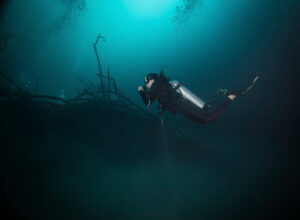What is a Certified Diver?
A certified diver is an individual who has successfully completed scuba diving lessons through a recognized training organization and is qualified to dive independently or with a buddy without the direct supervision of an instructor. The certification equips divers with the knowledge, skills, and confidence necessary to explore the underwater world safely and responsibly. This entry will discuss the process of becoming a certified diver, the different levels of certification, and the importance of ongoing education and skills maintenance.
Certification Process
The process of becoming a certified diver typically begins with the completion of a series of theoretical lessons, either in a classroom setting or through online modules. These lessons cover topics such as diving physics, physiology, equipment, and the marine environment. Students learn about the effects of pressure on the body, proper breathing techniques, and how to prevent and respond to potential diving emergencies.
Following the theoretical component, students engage in confined water training sessions, usually conducted in a swimming pool. During these sessions, they practice essential skills such as mask clearing, regulator recovery, buoyancy control, and emergency ascent procedures. This phase allows students to become familiar with scuba equipment and develop a level of comfort in the water.
Finally, students participate in open water dives under the supervision of an instructor. These dives provide an opportunity for students to apply the knowledge and skills they have acquired in a real-world setting. Upon successful completion of these dives and a final examination, students earn their certification as a certified diver.
Levels of Certification
Scuba diving offers a wide range of certifications, catering to the interests and aspirations of divers at every level of experience. These certifications typically follow a hierarchical structure, from basic entry-level qualifications to specialized and professional certifications. Each level comes with its own prerequisites, learning objectives, and skill set, all geared towards ensuring the diver’s safety while increasing their proficiency and enjoyment of underwater exploration.
Open Water Diver
The Open Water Diver certification forms the gateway to the world of scuba diving. This introductory level prepares divers to navigate the underwater environment independently or alongside a dive buddy, generally to depths not exceeding 18 meters (approximately 60 feet). It covers the fundamentals of scuba diving, including equipment familiarity, basic underwater navigation, and an introduction to marine life and ecosystems. This certification serves as the bedrock upon which all further diving education is built.
Advanced Open Water Diver
Following the initial Open Water Diver certification, divers may proceed to the Advanced Open Water Diver level. This certification is designed to refine and enhance the skills introduced in the open water course, with a particular focus on underwater navigation, buoyancy control, and diving planning. In addition, the Advanced Open Water Diver certification exposes divers to a range of specialized diving activities. These include deep diving (beyond 18 meters), wreck diving, and night diving, thereby broadening the diver’s experiences and abilities.
Rescue Diver
The Rescue Diver certification represents a significant leap in a diver’s educational journey, shifting the focus from personal skills and exploration to the safety and well-being of fellow divers. This course equips divers with the knowledge and techniques necessary for self-rescue and the rescue of others in emergency situations. It underscores the importance of preventative measures and instills in divers the ability to respond quickly, decisively, and effectively to a variety of underwater emergencies.
Divemaster
The Divemaster certification is the first step into professional scuba diving. Divemasters are trained to assist instructors in managing and teaching diving courses, lead certified divers on guided dive tours, and even conduct certain diving programs independently. This certification not only further hones a diver’s personal skills but also introduces the components of leadership and mentorship in the diving environment.
Instructor
At the apex of scuba diving certifications lies the Instructor certification. Scuba instructors are seasoned professionals, possessing a vast amount of knowledge and experience in various diving techniques, safety protocols, and the complexities of the marine environment. Certified to teach scuba diving courses across all levels, instructors play an integral role in shaping the next generation of divers, passing on their skills, knowledge, and passion for this extraordinary underwater world.
Certifying Organizations
A plethora of organizations globally offer certification for scuba diving, each with its unique curriculum, testing standards, and specialties. Within this diverse milieu, four organizations have gained particular prominence owing to their comprehensive course offerings, stringent safety protocols, and international recognition.
PADI (Professional Association of Diving Instructors)
The Professional Association of Diving Instructors, more commonly known as PADI, stands as the largest and most globally recognized scuba diving certification agency. PADI offers an array of courses and certifications that cater to a wide spectrum of divers, from beginners to seasoned professionals. What sets PADI apart is their commitment to creating a global community of divers with a shared passion for underwater exploration and conservation. Their courses, structured systematically, progressively introduce skills and knowledge needed for a safe and enjoyable diving experience.
SSI (Scuba Schools International)
Scuba Schools International, or SSI, holds a prominent position among certifying agencies. SSI differentiates itself with a unique, personalized approach to scuba training, where the learning pace is tailored to the individual diver. The underlying philosophy at SSI is to cultivate a comfort level and confidence in the water that goes beyond mere technical knowledge. Through practical, hands-on learning experiences, SSI aims to imbue divers with a true sense of ownership and autonomy in their underwater adventures.
NAUI (National Association of Underwater Instructors)
Founded in 1960, the National Association of Underwater Instructors (NAUI) is the oldest scuba certification organization in the United States. NAUI has built a legacy of diving instruction that underscores high standards in both the practical and theoretical facets of diving. They are renowned for their commitment to safety, ensuring every NAUI-certified diver is equipped with the skills and knowledge necessary to manage underwater environments responsibly. Furthermore, NAUI places a strong emphasis on environmental awareness, fostering a community of divers who respect and cherish the world beneath the waves.
BSAC (British Sub-Aqua Club)
The British Sub-Aqua Club, known as BSAC, is a UK-based organization offering scuba diving courses and certifications that conform to the internationally recognized ISO standards for recreational diving. BSAC stands out due to its blend of technical excellence and a strong club-based community ethos. They not only focus on producing proficient divers but also invest in nurturing a spirit of camaraderie and shared learning within their community. Their dedication to safety, combined with their adherence to international standards, ensures BSAC divers are equipped with the knowledge and skills to enjoy diving experiences in various environments safely.
Ongoing Education and Skill Maintenance
Becoming a certified diver is only the beginning of a diver’s journey in the underwater world. It is crucial for certified divers to continue their education and regularly practice their skills to maintain proficiency and enhance their diving experiences. There are several ways to achieve this:
Specialty Courses
Many diving certifying bodies offer specialty courses tailored to different aspects of scuba diving, including cavern diving. These highly focused courses provide an avenue for divers to explore their passion for the mesmerizing and mysterious world beneath the water’s surface. They provide training on essential aspects such as safe entry and exit strategies, maintaining proper buoyancy, navigation within the caverns, and dealing with potential hazards. Further advanced courses may delve into areas like underwater cave photography, allowing divers to capture the hidden beauty of these subaqueous cathedrals.
Technical Diving
Cavern diving is considered an aspect of technical diving due to its increased complexity and risk factors. Unlike recreational scuba diving, which typically limits itself to shallower waters and straightforward environments, cavern diving introduces new challenges like navigating through restricted passages and managing limited visibility. As a result, technical diving knowledge is paramount for cavern divers. This knowledge includes understanding advanced equipment like twin-set cylinders, dive lights, and guideline reels, as well as specialized techniques for gas management, dive planning, and dealing with emergencies. It’s vital for divers to adhere to rigorous safety protocols to manage these complexities effectively.
Dive Clubs and Communities
To enhance skills and expand their diving experiences, many divers opt to join cavern diving clubs or larger diving communities. These associations provide an incredible platform for divers to share and gain knowledge, recounting their unique underwater stories and experiences. It also opens up opportunities for group dives, trips to different cavern locations, and participation in diving events. Not only does this sense of camaraderie fuel a shared passion, but it also promotes a culture of safety, learning, and respect for the underwater environment.
Refreshers and Skill Updates
Finally, any seasoned diver will vouch for the value of refresher courses and skill updates, especially in the field of cavern diving. These are highly recommended for those who’ve had an extended break from diving or are transitioning from other diving specialties. These sessions offer a practical way to revisit essential skills, review theoretical knowledge, and familiarize oneself with any new advancements in equipment or procedures. By partaking in these courses, divers ensure they are prepared, confident, and ultimately safer when returning to the dark, quiet tranquility of the underwater caverns.
Environmental Stewardship and Conservation
Environmental stewardship and conservation lie at the heart of the scuba diving ethos, particularly in the specialized domain of cavern diving. As certified divers, individuals have a rare window into an underwater world seldom seen by human eyes, where they can marvel at the intricate delicacy of marine ecosystems and the staggering diversity of life they harbor. The same factors that make cavern diving so mesmerizing – the untouched beauty, the fragile habitats, and the intricate balance of the underwater world – are also what render these environments susceptible to human interference. This is why environmental stewardship and conservation are so fundamental to the sport.
Adopt a “Leave No Trace” mentality
The first pillar of this stewardship is the adoption of a “Leave No Trace” mentality. In the tight confines of an underwater cavern, even minor disturbances can have significant consequences. Divers should therefore strive to minimize their interactions with the marine environment to preserve it for future generations. This includes avoiding touching or disturbing coral and other underwater organisms that may inhabit caverns, as these forms of marine life can be highly sensitive to changes in their environment. Equally, it’s crucial that divers resist the temptation to collect souvenirs from underwater caves or dispose of any waste in the water, both of which can disrupt delicate ecosystems and threaten the survival of the diverse species that call these habitats home.
Support Marine Protected Areas
Choosing to dive in Marine Protected Areas (MPAs) can also offer a significant contribution to the preservation of critical habitats. MPAs are zones designated for the protection of marine life and habitats, where human activity is regulated to minimize negative impacts. By electing to dive in MPAs, divers not only help in maintaining the health of these areas but also often support local communities that rely on sustainable tourism for their livelihoods. Through this action, divers can be part of a larger system of environmental stewardship, helping protect the marine environment and bolster local economies at the same time.
Participate in conservation initiatives
Finally, participating in conservation initiatives can have a significant impact. There are numerous organizations, such as Project AWARE and Coral Reef Alliance, that offer programs and resources for divers to actively engage in marine conservation efforts. Opportunities range from participating in beach clean-ups to assist in maintaining the purity of our shorelines, to joining coral restoration projects that aim to rehabilitate damaged coral ecosystems. Divers can also engage in citizen science initiatives, contributing valuable data about the underwater world that can inform future conservation efforts. Participation in these initiatives allows divers to not only appreciate the awe-inspiring spectacle of cavern diving but also to contribute in a tangible way to the continued survival of these underwater wonders.
Becoming a certified diver opens up a world of adventure and discovery beneath the waves. With proper training, ongoing education, and a commitment to responsible diving practices, certified divers can enjoy a lifetime of underwater exploration while contributing to the preservation of our planet’s precious marine resources.

